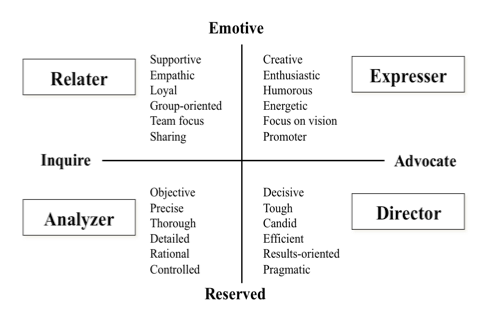Being a project manager comes with it’s daily challenges, but as projects are initiated and team members are identified, I find one of the most difficult issues to tackle is people management; specifically, managing differing personalities. When dealing with many stakeholders I find it critical to quickly hone in on a personality type and adapt my conversation style on an individualistic basis. What this does is give me the ability to naturally appeal to their character in the interest of establishing a relationship that fosters understanding and collaboration… it’s kinda like being a personality chameleon.
Find ways to reach your team on a personal level in an effort to foster effective engagement in your project.
For some folks this doesn’t come easily and I recently took a training class that taught more about influencing skills. Based on the works of People Performance Solutions, it guides you to understand people’s “Interaction Styles”. Essentially it’s identifying character traits in 4 categories and then using your knowledge of these traits to appeal to their individual character. The categories were identified as follows:
Director – The take charge type who like to get things done.They are decisive, effective, task oriented, and results driven.
Analyzer – Reasonable, formal, and task focused, these individuals like factual data that is thorough and complete. They are slower to make decisions as they are risk averse.
Relater – These are the calm and easy to approach individuals. They tend to blend in, are soft spoken and don’t really have urgency about them. They thrive on personal relationships and are team players.
Expresser – Energetic and enthusiastic, these people are quick, creative, risk takers who show emotion in everything they do.

Everyone generally falls into one of these categories (though we all have moments that push us to act differently). The reason why it’s so important to identify one’s character is that everyone communicates and handles stress differently. Imagine finally being able to reach out to that one stakeholder that gives everyone a hard time… wouldn’t that be great for your project?
So how do you pinpoint where they stand…
1 – First, pay attention to how they communicate actions. Do they ask more questions or do they make more statements? If they are more of the introspective/questioning type then they are either Relaters or Analyzers. However, if they are more direct, quick, and action oriented, they are most likely Expressers or Directors.
2 – Next break it down further and examine how they communicate their emotion. Are they more expressive or more reserved? If they show more emotion and you basically know where you always stand with this person, they are either Relaters or Expressers. If they are more reserved and harder to read then they fall under the Analyzer or Director category.
3 – Use your findings to put them in a single category. So for example, if they tend to ask questions and are more reserved, most likely they are the Analyzer type.
Once you pinpoint which category they fall under, you can then tailor your conversation based on their personality type.
Directors – They like you to get to the point. Being emotional around them will turn them off. Talk to them confidently and earn their trust by being competent. Show them you are taking ownership of a task and bring solutions to the table, not problems.
Analyzers – Use logic and structure when talking to them. They also don’t do well around highly emotional people or complainers. Show them options and provide as much data points as possible on how you reached a conclusion. Give them time to assess. They like being given a heads up if something is coming their way.
Relaters – Establish a relationship with this person. Listen to what they have to say and ask for their opinion… relate to them. They are not good under stress and will almost always give in to pressure but they are on everyone’s good side so be wary of their influence on the team.
Expressers – Show genuine concern for this individual. Share the challenges and ask them for help. They are always looking for a win/win scenario. They like to see you’re as emotionally engaged with the problem as much as they are.
So there you have it… this a quick and easy tool you can use to reach that one team member that has been a pain for you to deal with. Try it out and let me know what happens!